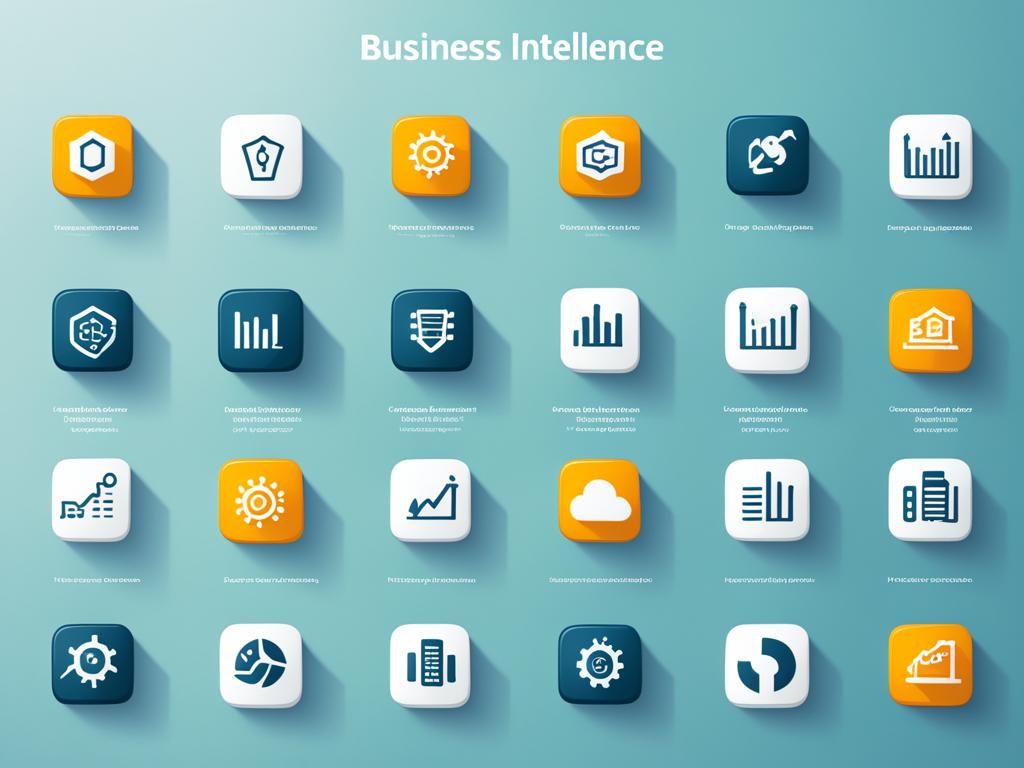Welcome to our comprehensive guide comparing the top business intelligence tools available in the market. When it comes to data analytics and reporting, having the right tools in place is crucial for your organization’s success. With the ever-increasing volume of data, it’s essential to leverage business intelligence tools to unlock valuable insights and make informed decisions.
In this article, we will explore the features and capabilities of various business intelligence tools, also known as BI tools, data analytics tools, and reporting software. By comparing their functionalities, you’ll gain a better understanding of which tool is best suited to meet your organization’s specific needs.
But first, let’s take a moment to understand the fundamentals of business intelligence tools and how they can transform your data analytics and reporting processes.
Understanding Business Intelligence Tools
When it comes to harnessing the power of your data, business intelligence tools play a vital role. These tools offer a range of features and functionalities designed to simplify data analytics, visualization, and reporting processes. Whether you need dashboard tools for data visualization, advanced data analytics platforms, or comprehensive business intelligence solutions, there is a tool available to suit your organization’s needs.
Dashboard tools enable you to transform complex datasets into visually appealing and interactive dashboards. These tools allow you to monitor key business metrics, track performance, and gain real-time insights into your data. With intuitive drag-and-drop interfaces and customizable visualizations, dashboard tools make it easy to analyze and present data in a meaningful way.
Data visualization platforms take data exploration to the next level, offering a range of interactive charts, graphs, and maps to help you uncover patterns, trends, and outliers in your data. These platforms provide a rich set of visualization options, allowing you to create compelling visual representations of your data that facilitate better decision-making.
Meanwhile, business intelligence solutions offer a comprehensive suite of tools and capabilities to support your organization’s data management and reporting needs. These solutions typically include data integration, data modeling, and reporting functionalities, providing a centralized platform for data-driven decision-making. With business intelligence solutions, you can efficiently manage and analyze large volumes of data, derive actionable insights, and generate accurate reports.
Business analytics software forms the backbone of any successful data-driven organization. These tools enable you to extract valuable insights from your data through advanced analytics techniques such as predictive modeling, data mining, and machine learning. By leveraging business analytics software, you can uncover hidden patterns, identify key drivers of performance, and make informed decisions based on data-driven evidence.
Understanding the different types of business intelligence tools available empowers you to choose the ones that align with your organization’s goals and requirements. Whether you need powerful data visualization capabilities, robust data management functionalities, or advanced analytics tools, the right business intelligence tool is crucial in unlocking the true potential of your data.
Choosing the Right Business Intelligence Tool for Your Needs
When it comes to selecting the right business intelligence tool for your organization, it’s essential to consider various factors that align with your specific needs. By carefully evaluating these aspects, you can ensure that the chosen tool empowers your data analytics and reporting processes for optimal decision-making.
Factors to Consider
- Scalability: Evaluate the tool’s scalability to accommodate your organization’s data growth. Ensure that it can handle large volumes of data without compromising performance.
- Ease of Use: Look for a tool that offers an intuitive interface and user-friendly features. This will enable your team to quickly adopt and utilize the tool effectively.
- Integration Capabilities: Consider the tool’s ability to integrate seamlessly with your existing systems and databases. This ensures smooth data flow and eliminates redundancies.
- Pricing Options: Assess the pricing structure of the tool and determine if it aligns with your budget. Consider the value it provides in terms of features, support, and scalability.
Popular Business Intelligence Tools
To help you make an informed decision, let’s review some popular business intelligence tools and their strengths:
- Tool A: Known for its robust data visualization capabilities, Tool A offers interactive dashboards and advanced reporting functionalities. It simplifies complex data analysis and provides actionable insights.
- Tool B: With powerful predictive analytics capabilities, Tool B enables you to uncover valuable patterns and trends in your data. It offers sophisticated algorithms and machine learning techniques for accurate forecasting.
- Tool C: Ideal for organizations seeking a comprehensive business intelligence solution, Tool C combines data integration, analytics, and reporting features. It provides a centralized platform for end-to-end data management.
By considering these factors and exploring the strengths of popular business intelligence tools, you can select the one that best suits your organization’s needs. Remember, choosing the right business intelligence tool is crucial for unlocking the full potential of your data analytics and reporting efforts.
Conclusion
Throughout this article, we have explored the significance of leveraging business intelligence tools, such as BI tools, data analytics tools, and reporting software, for informed decision-making. These tools offer a comprehensive solution for transforming your data into valuable insights.
By utilizing business intelligence tools, you can streamline your data analytics and reporting processes, enabling you to make data-driven decisions with confidence. These tools provide efficient data visualization, advanced analytics capabilities, and robust reporting functionalities, empowering you to uncover hidden patterns and trends within your data.
When choosing the right business intelligence tool for your organization, consider factors like scalability, ease of use, integration capabilities, and pricing options. It is crucial to select a tool that aligns with your specific business requirements and goals.
In conclusion, business intelligence tools are instrumental in enhancing your decision-making processes. By harnessing their power, you can unlock the full potential of your data and gain a competitive edge in today’s data-driven landscape.
